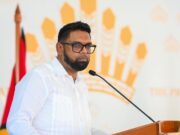The Government of Guyana (GoG) plans to apply part of the US$20M loan it received from the World Bank (WB) to pay a consulting firm for a Strategic Environmental & Social Assessment (SESA) for the Guyana Petroleum Resources Governance and Management Project (GPRGMP).
This is according to several notices published in the local print media. The notice was placed by the Department of Energy, Ministry of the Presidency, under the heading: “Expression of Interest (Consulting Services – Firms Selection).”
The notice states that the consultancy firm will facilitate the preparation of a SESA for Guyana’s new oil and gas sector to help meet long-term country development outcomes by integrating environmental, social (including labour), health, safety, and security considerations in oil and gas policies, laws, and sector growth.
On the whole, considering the ongoing and proposed development and capacity building activities for the oil and gas sectors, the SESA will provide a comprehensive sector-wide examination of potential impacts, both positive and negative, and identify gaps in regulations, institutional capacity, and public consultation mechanisms.
The estimated duration for the assignment is for 15 months commencing in 2019.
A Consultant will be selected in accordance with the Quality-And-Cost Based Selection (QCBS) method set out in the procurement regulations.
According to the World Bank, the GPRGMP consists of four components, with the first being the enhancement of legal framework and stakeholder engagement. This component aims to support the update of Guyana’s legal and regulatory frameworks for the governance and oversight of the sector, as well as support stakeholder engagement and transparency.
The second component is the capacity-building of key institutions. This component includes four subcomponents: support immediate technical needs at key institutions with responsibility for oil and gas; support critical training needs at key institutions with responsibility for the sector; build up petroleum data management; and strengthen environmental and social management.
The third component is the enhancement of fiscal management.
Finally, the fourth component is project management. This component will provide support to GoG to manage and coordinate all project activities financed under the project. More specifically, it will provide support and build the government’s procurement, financial management, safeguards management, monitoring and evaluation capacity through the provision to the Project Implementing Unit (PIU), Department of Energy, of technical advisory services, training, recruitment of instrumental staff as needed, acquisition of goods, and operating costs.













